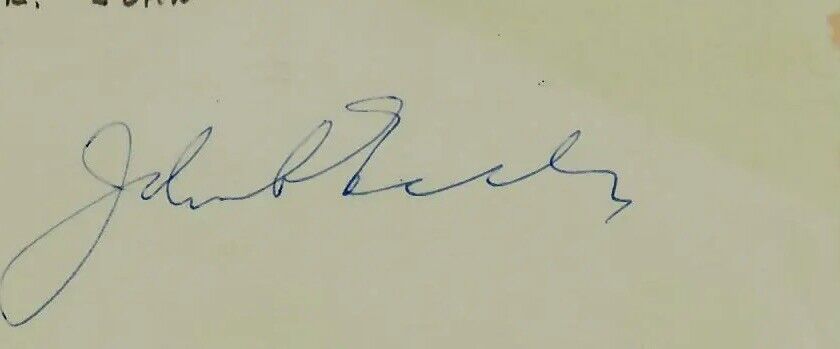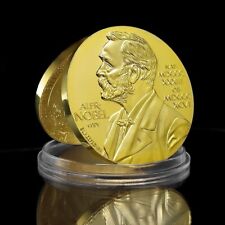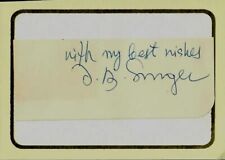\"Nobel Prize in Medicine\" John Eccles Hand Signed 3X5 Card Todd Mueller COA For Sale

When you click on links to various merchants on this site and make a purchase, this can result in this site earning a commission. Affiliate programs and affiliations include, but are not limited to, the eBay Partner Network.
\"Nobel Prize in Medicine\" John Eccles Hand Signed 3X5 Card Todd Mueller COA:
$90.99
Up for sale the\"Nobel Prize in Medicine\" John Eccles Hand Signed 3X5 Card. This item is certified authentic by Todd Mueller Autographs and comes with their Certificate of Authenticity.ES-4505
Sir John Carew EcclesACFRSFRACPFRSNZFAA(27 January 1903 – 2 May 1997) was an Australianneurophysiologistand philosopher who won the 1963Nobel Prize in Physiology or Medicinefor his work on thesynapse. He shared the prize withAndrew HuxleyandAlan Lloyd Hodgkin. Eccles was born inMelbourne, Australia. He grew up there with his two sisters and his parents: William and Mary Carew Eccles (both teachers, whohome schooledhim until he was 12). He initially attended Warrnambool High School(nowWarrnambool College) (where a science wing is named in his honour), then completed his final year of schooling atMelbourne High School. Aged 17, he was awarded a senior scholarship to study medicine at theUniversity of Melbourne.As a medical undergraduate, he was never able to find a satisfactory explanation for the interaction of mind and body; he started to think about becoming a neuroscientist. He graduated (with first class honours) in 1925, and was awarded aRhodes Scholarshipto study underCharles Scott SherringtonatMagdalen College,Oxford University, where he received his Doctor of Philosophy in 1929. In 1937 Eccles returned to Australia, where he worked on military research duringWorld War II. During this time Eccles was the director of Kanematsu Institute atSydney Medical School,he andBernard Katzgave research lectures at theUniversity of Sydney, strongly influencing its intellectual environment. After the war, he became a professor at theUniversity of Otagoin New Zealand. From 1952 to 1962 he worked as a professor at theJohn Curtin School of Medical Research(JCSMR) of theAustralian National University. The Eccles Institute of Neuroscience is headquartered in a new wing of the JCSMR building, constructed with the assistance of a $63M grant from the Commonwealth Government and completed in March 2012. In the early 1950s, Eccles and his colleagues performed the research that would lead to his receiving the Nobel Prize. To study synapses in the peripheral nervous system, Eccles and colleagues used the stretch reflex as a model, which is easily studied because it consists of only twoneurons: a sensory neuron (themuscle spindlefibre) and themotor neuron. The sensory neuron synapses onto the motor neuron in thespinal cord. When a current is passed into the sensory neuron in thequadriceps, the motor neuron innervating the quadriceps produced a smallexcitatory postsynaptic potential(EPSP). When a similar current is passed through thehamstring, the opposing muscle to the quadriceps, aninhibitory postsynaptic potential(IPSP) is produced in the quadriceps motor neuron. Although a single EPSP was not enough to fire anaction potentialin the motor neuron, the sum of several EPSPs from multiple sensory neurons synapsing onto the motor neuron can cause the motor neuron to fire, thus contracting the quadriceps. On the other hand, IPSPs could subtract from this sum of EPSPs, preventing the motor neuron from firing. Apart from these seminal experiments, Eccles was key to a number of important developments inneuroscience. Until around 1949, Eccles believed thatsynaptic transmissionwas primarily electrical rather than chemical. Although he was wrong in this hypothesis, his arguments led him and others to perform some of the experiments which proved chemical synaptic transmission.Bernard Katzand Eccles worked together on some of the experiments which elucidated the role ofacetylcholineas aneurotransmitterin the brain.

Related Items:
Alfred Nobel Peace Prize Medal Coin
$25.00
"Nobel Prize in Literature" Isaac Singer Clipped Signature Mounted
$149.99
"Nobel Prize in Economics" Jan Tinbergen Signed Business Card
$199.99



